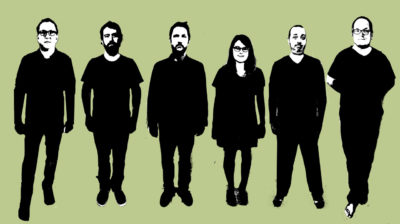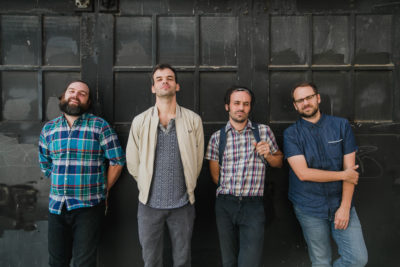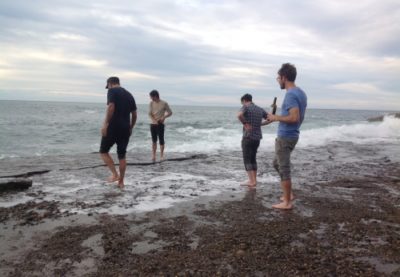Cursive
Over the past two decades, Cursive has become known for writing smart, tightly woven concept albums where frontman Tim Kasher turns his unflinching gaze on specific, oftentimes challenging themes, and examines them with an incisively brutal honesty. 2000’s Domestica dealt with divorce; 2003’s The Ugly Organ tackled art, sex, and relationships; 2006’s Happy Hollow skewered organized religion; 2009’s Mama, I’m Swollen grappled with the human condition and social morality; and 2012’s I Am Gemini explored the battle between good and evil. But the band’s remarkable eighth full-length, Vitriola, required a different approach — one less rigidly themed and more responsive as the band struggles with existentialism veering towards nihilism and despair; the ways in which society, much like a writer, creates and destroys; and an oncoming dystopia that feels eerily near at hand.
Cursive has naturally developed a pattern of releasing new music every three years, creating records not out of obligation, but need, with the mindset that each record could potentially be their last. 2015 came and went, however, and the band remained silent for their longest period to date. But the members of Cursive have remained busy with solo records, a movie (the Kasher-penned and directed No Resolution), and running businesses (the band collectively owns and operates hometown Omaha’s mainstay bar/venue, O’Leaver’s). The band even launched their own label, 15 Passenger, through which they’re steadily reissuing their remastered back catalogue, as well as new albums by Kasher, Campdogzz, and David Bazan and Sean Lane. And like many others, the band members have been caught up in the inescapable state of confusion and instability that plagues their home country, and seems to grow more chaotic with each passing day.
Which brings us to 2018 and Vitriola. For the first time since Happy Hollow, the album reunites Kasher, guitarist/singer Ted Stevens and bassist Matt Maginn with founding drummer Clint Schnase, as well as co-producer Mike Mogis (Bright Eyes, M. Ward, Jenny Lewis) at ARC Studios in Omaha. They’re joined by Patrick Newbery on keys (who’s been a full-time member for years) and touring mainstay Megan Siebe on cello. Schnase and Maginn are in rare form, picking up right where they left off with a rhythmic lockstep of viscera-vibrating bass and toms, providing a foundation for Kasher and Stevens’ intertwining guitars and Newbery and Siebe’s cinematic flourishes. The album runs the sonic gamut between rich, resonant melodicism, Hitchcockian anxiety, and explosive catharsis — and no Cursive album would be complete without scream-along melodies and lyrics that, upon reflection, make for unlikely anthems.
There’s a palpable unease that wells beneath Vitriola’s simmering requiems and fist-shakers. Fiery opener “Free To Be or Not To Be You and Me” reflects the album’s core: a search for meaning that keeps coming up empty, and finding the will to keep going despite the fear of a dark future. The album directs frustration and anger at not only modern society and the universe at large, but also inward towards ourselves. On “Under the Rainbow,” disquiet boils into rage that indicts the complacency of the privileged classes; “Ghost Writer” has a catchy pulse that belies Kasher chastising himself for writing about writing; and “Noble Soldier/Dystopian Lament” is a haunting look at potential societal collapse that provides little in the way of hope but balances beauty and horror on the head of a pin.
Vitriola raises a stark question: is this it? Is everything simply broken, leaving us hopeless and nihilistic? Maybe not. There can be reassurance in commiseration, and the album is deeply relatable: Cursive may not be offering the answers, but there is hope in knowing you’re not alone in the chaos.
mewithoutYou
It is no mistake that mewithoutYou have become one of today’s most fascinating experimental rock acts. The last 15 years have borne witness to the Philadelphia five-piece exercising stylistic evolutions and aerial dynamics with humbling dexterity and untamed ambition. At their roots may be a theatrical progressive punk/post-hardcore band, but they’ve never been content to remain comfortably within a familiar genre. Their continuous multi-directional movements have left them increasingly difficult to classify, the growth of their branches impossible to predict. The group’s sixth full-length album, Pale Horses, is the best evidence to date of their eclectic agility.
The one constant in mewithoutYou’s storied career has been lead singer Aaron Weiss’ ability to sketch ornate, thought-provoking narratives. Seamlessly weaving his signature holler amidst whispered storytelling and stream-of-consciousness outpourings, his latest offerings vacillate between the emotionally wracked, vibrantly symbolic, and ambiguously metaphysical. His meandering, technicolor vision of a world apocalyptic—populated with werewolves and vulturemen, shape-shifters and apparitions, android whales and an Idaho bride—combines the fantastic opulence of the group’s recent albums with the vulnerable personal confessions of their earliest work.
Longtime band-mates Mike Weiss, Rickie Mazzotta and Greg Jehanian continue to craft dramatic, nightmare soundscapes which lavishly complement their singer’s ecstatic hallucinations. The addition of Brandon Beaver (of Buried Beds, the Silver Ages) allows the group as a 5-piece to revisit its earlier intricate, layered fretwork, while adding new depths of vocal harmonies and ever-peculiar arrangements. Musically, the group hearkens boldly to the raw intensity of 2004’s Catch for Us the Foxes, while building on the rich imagery of 2006’s Brother, Sister. Epic in scope, Pale Horses is mewithoutYou at their best, breathing fresh life into the end times, gloriously terrifying and hauntingly iconic.
Their latest album also marks a new beginning for the band, as it’s their first to be released on Run for Cover Records. Teaming with the rising Boston independent label was the outgrowth of their partnership with Will Yip, whose masterful production transforms the band’s transcendental musings into a widescreen experience. Drums and bass lines quake with the faults of the earth, as an army of guitars and multi-instrumental nuances ring in the paranoia, mass hysteria and peaceful exaltation. The result is a stunning collage—fitfully disturbing, steadily bizarre, uniquely celebratory—undoubtedly the grandest musical adventure yet conceived within mewithoutYou’s expanding tapestry.



